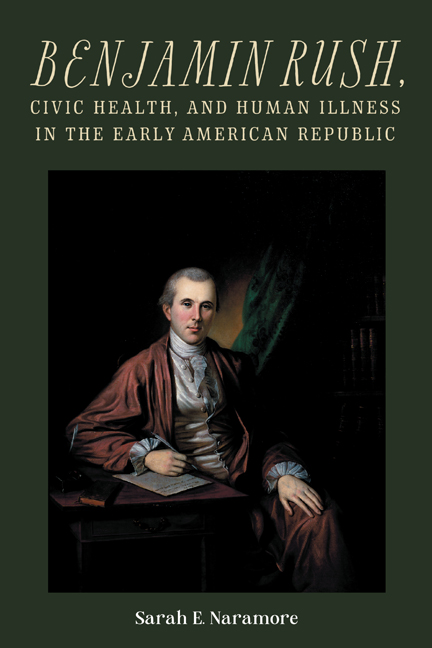1 - The Education of Benjamin Rush
Published online by Cambridge University Press: 10 January 2024
Summary
Benjamin Rush was both remarkable and ordinary as he began his medical practice in Philadelphia in 1769. The twenty-four-year-old son of a middling family returned to his hometown ambitious and fresh from the excitement of European capitals. He held a medical degree from the University of Edinburgh, visited London hospitals, and attended Parisian salons. Rush had come a long way in his short life. Before his departure, he already held a bachelor's degree from the College of New Jersey (Princeton University) and privately studied medicine under Dr. John Redman in Philadelphia. Such credentials proved more than sufficient to practice medicine in the American colonies. They did not, however, match the ambitions of the young Rush. He belonged to a generation of change that hoped to elevate medicine to a true, learned profession in colonial—soon independent—cities. As part of this promise, the Chair of Chemistry at the new Philadelphia medical school waited for him.
Over the course of the 1770s, the precocious young man successfully turned himself into a leading gentleman. His credentials placed Rush in a tiny minority of highly educated Americans before the Revolutionary War. The colonies boasted only a handful of colleges and no medical schools in the early 1760s when Rush arrived at Princeton's Nassau Hall. The individual lectures available from John Morgan and William Shippen Jr. at middecade did not yet add up to a medical school. Beyond his degrees and some personal charm, however, Rush lacked the kind of social standing he feared he needed to make it financially in Philadelphia. Degrees were one thing, but doctors needed patients. He had intellectual connections and proud mentors but limited family money. Additionally, as he began his career Rush knew his family saw him as an investment in their future. If he failed, he failed more than just himself but his mother, older sisters, and younger brother. Years later when completing his autobiography, middle-aged Rush looked back on his youth as one of economic struggle. He was the son of a gunsmith and farmer with a gentleman's degree; a Presbyterian in a Quaker and Anglican town.
- Type
- Chapter
- Information
- Publisher: Boydell & BrewerPrint publication year: 2023

